I visited India once, in August, 2004, staying for seven days. My intention was to go to present-day Dewas, in Madhya Pradesh, and visit and photograph places that appear in Forster’s autobiographical The Hill of Devi (1953). I also anticipated visiting other towns Forster had been to during his second visit. Having enjoyed Forster’s reminiscences, and grown up under the thrall of the verbal and figurative ingenuities of A Passage to India (1924), I wanted to see what might have provided physical settings for them. Desires can be uncomplicated. Fulfilled ones less so.
My Dewas photographs aimed to complement Forster's. The gap of over 80 years was to be the point. Where Forster worked with plates, using time-lapse, and had to stage-manage his scenes owing to the inflexibility of the equipment, I used an unobtrusive fast-working digital camera. Where Forster’s pictures are necessarily framed by ceremonial and display, supporting a view of the past as monumental History (capital aitch), mine, with their pixels, colour-choices, speed and brevity, feed into a view of the world as largely chimerical and disposable.
Dewas has attracted very little attention from tourists, even Indian ones. When I told Indian friends I was going to India, they assumed, reasonably enough, that I would be visiting a major tourist site like Jaipur or Agra or the beaches of Goa at least, not Dewas. I was regarded with incomprehension or worry when I explained where and what it was.
To begin with, I thought I'd track Forster's footsteps, from his point of arrival. Forster went to Bombay (present-day Mumbai) first, probably arriving by P & O passenger ship. (The Peninsular and Oriental was the major shipping-line carrying Britain's colonial officials, traders, planters, ministers of God, adventurers and tourists back and forth across the Empire during the early part of the twentieth century.) In Bombay, he appears to have stayed with friends in the colonial splendour of Napier Road. I flew in by a Boeing jet, landing at Mumbai International Airport, and went straight to the Taj Mahal Palace Hotel, Heritage wing, which seemed about as close as I could get to both Napier Road and the British Empire. They didn't have any record of Forster at the hotel and were surprised that I had no idea that the Taj had always belonged to the local Tata family. Still the atrium and the rattan lounge-chairs were redolent of sahibs and ginslings. 'Is that a "tatty"?' I enquired of a porter, pointing hopefully at what to my mind was an unusual sort of window covering. 'A "tatty", sir?' he said, hesitantly. He didn't seem to want to disappoint me, but in the end reality overcame his training. 'It's called a "curtain", sir'.
Reality has made inroads even into the remote other-world of backpackers. Reality deals in credit cards, on-line banking and monogrammed toilet soap. Reality is neatly suited, elegantly coiffed and is more at home hosting high-powered business luncheons than handing out room-keys to malodorous travellers in flip-flops.
Tourism is said to be the secular equivalent of religious pilgrimage. You go round sites, in lieu of shrines, reciting Lonely Planet recommendations rather than prayers. Remembering this, I made an effort to take in something my friends might have approved of. The hotel's immediate environs included an edifice, shaped like a steam-iron on its end. This was called the Gateway for India, which had been built by the British to commemorate the visit of King George V and his wife in 1924. Tourists circulated here with guidebooks and cameras, and touts, hawkers and beggars chased after them with babies, barley, lengths of cotton bracelet and unusual offers. It isn't a very pleasant experience for either group, hardening into theatrical attitudes. (One guy who followed me, employing an intimate lilting tone probably intended to reassure, flew into a rage when I kept my prim British eyes averted. 'Fuck you!' he screamed, strutting off with outraged gestures.) The former, for the most part, seeks originality, the aura of what was, untainted by modernity and its rags; the latter just wants a piece of the cake, a piece of the action, i.e. the present, which is passing by with a foreign accent. It all seems so messy, so out of kilter, too intractable for epiphany. Yet perhaps this is where the true experience, the saving grace of tourism, should be found, in the awkwardness of that encounter, outside the purple guide-ropes, the smell and bump of different expectations.
8th August. Bombay Central. This is where you go to catch the Avantika Express to Indore, taking in Dewas en route (‘two minutes to disembark, sir, you must be nimble on your feet’). It’s a 13-hour journey, so a sleeper is an advantage. They didn’t have First Class (source of seductive aperçus from travel-writers and post-imperial exoticists), so I slept in an open, could-be curtained-off Second Class compartment, occasionally disturbed by shoeshine boys, mice, and men with sing-song voices selling tea. (I mention the curtains because, on my return, I had to share the compartment with a woman of eyecatching girth who pulled them to with a snap, before snoring at full volume as if to test the acoustics. Each snore would begin on a rumbling note, proceed up an operatic scale, not completely unpleasant on the ear, before emerging in a piercing whistle from pursed lips.) At dawn, the scenery through the greasy windows was rain-sodden and very flat and green, with stretches of exposed red earth, clumps of stubby black palms, rushing rivers and the odd crazily gesticulating idol. Forster hated Indian train travel—too hot and soupy—but one of his richest (comic yet fraught with cultural consequence) scenes in The Hill of Devi involves a train journey with the maharajah’s court. The scene probably inspired the railway journey to the Marabar Hills in the first part of A Passage to India.
9th August. I was nimble on my feet, jumping off at Dewas into a shower of cool muddy rain. An auto-rickshaw driver took me to my ‘hotel’. I put this word in scare-quotes, not because the hotel was terrible, which it wasn’t, but because I’m not sure it wasn’t somebody’s home, and the owner was too polite to tell me. No one spoke enough English to tell me anything anyway, and I had no Hindi. A crowd of smiling youths gathered round me, in my room, guffawing amiably, whenever I attempted to close the door on them. They brought me vegetarian dishes with sinister-looking ingredients and stayed to watch me eat, sometimes glancing at my camera charging in the corner and whispering to one another. I bolted the door that night, such is the chastening paranoia of mono-lingualism. Later, it occurred to me that I might actually have been the first tourist to Dewas in the boys’ lifetime and that the dishes were rather tasty and nourishing.
In Dewas, Forster appears have experienced little in the way of metaphysical despair. The maharajah and family spoke English, for one thing, and had adopted English domestic habits and manners for another. In fact, Forster seems to have had a rare old time, romping with his host amongst the crockery, dressing up in native finery, and even sharing his bed with a well-disposed bullock. His job was not onerous. When he wasn’t marvelling over Tikuji’s collection of broken pianos, or negotiating family quarrels, he was out in the garden sewing marigolds. Against this mundane, slightly farcical backdrop, the grand fears, conflicts and failures to connect that drive the narrative of A Passage to India seem rhetorical, ploys to counter boredom and say something timeless and true. Perhaps only when we’re bored (or at least with too much time on our hands) do we ever say anything timeless and true… Forster was seriously bored most of the time, teasing northern European gravity out of laughter and ruins, dust and peepul trees.
He said Dewas was neither beautiful nor interesting, except for its hill, where steps led up through ‘chapels’ to a temple at the top dedicated to the goddess Chamunda—whom, he claimed, clutched the severed head of a demon in her hand. He also mentions a garden, where he went to enjoy peace and quiet and sit under leafy trees, watching fruit bats come to feed in the evening, and a lake or ‘tank’ near the Palace, where he could relax in a row-boat. He took a photograph of the hill from a spot close to the Guest House, its summit looming with a sort of gentle menace over the water. Those few sights—hill, the goddess Chamunda, Palace, garden, lake and Guest House—were what I had come to see, more or less from the same angle as Forster had seen them, at least in his photographs. I didn’t wonder whether seeing them, being there where Forster might have been, would account, in some way, for that deferral of connection between worlds—East and West, India and the British, Aziz and Fielding—that comes at the end of his novel.
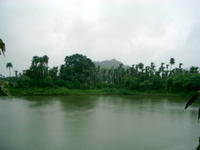
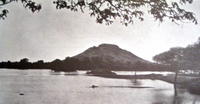
This, in full, was not what I wondered:
‘Why can’t we be friends now?’ said the other, holding him affectionately. ‘It’s what I want. It’s what you want’.
But the horses didn’t want it—they swerved apart; the earth didn’t want it, sending up rocks through which riders must pass single-file; the temples, the tank, the jail, the palace, the birds, the carrion, the Guest House, that came into view as they issued from the gap and saw Mau beneath: they didn’t want it, they said in their hundred voices, ‘No, not yet’, and the sky said, ‘No, not there’.
I had no idea how to find any of the places mentioned in Forster's reminiscences. Oddly (later I would see it clearly from the station), the hill was not visible on the skyline, and for a moment I thought I’d come to the wrong place. As there was only one road in Dewas, and it was about a mile long, the best thing to do seemed to be to go along it, looking to right and left. I got into an auto-rickshaw and pointed north. The driver did his best not to let me down, grinning or shrugging enthusiastically. ‘Maharajah Tikuji Rao?’ I said, pointing to a cement statue that looked more like a cold war despot than Forster’s portraits of his boss. ‘Palace? Tank? Guest House? Garden of peace and fruit bats?’ The driver threaded his way through cows, puddles and plump dogs. The monsoon and rickshaws had turned the road into a motor-cross event, folds of black mud thrown back against the hovels and crumbling shop-fronts. Then the hill emerged from behind a row of blue polythene roofs. The hill of Devi. Yes, it must be.
There was a stone portal at the bottom of a flight of steps, bright yellow floral garlands, a kiosk selling coconuts and refreshments, a moon-faced idol in a pot. The steps looked far too large. In my mind’s eye, I saw Forster, tall, fabulously elongated, dressed in black, like a figure in a Mervyn Peake drawing, ascending the steps, hands pushing down on each knee, chin jutting out. Cool rain blowing off the hill, turning his hair into cowlicks. Then it was me, climbing, heaving myself up, hand pressing down on a knee.
I passed people sitting cross-legged in front of mounds of coconuts and bananas, which they wanted me to purchase (offerings for the goddess, I guessed), aged saddhus with granny legs and Bob Geldof hairstyles, children playing ‘spit’ from the railings, women with begging bowls, goats and fat hairy pigs truffling amongst the chapels. The chapels were small as ovens. Each had the same bright red moon-faced deities inside. In one, I saw a pair of these objects laid side by side like supermarket pastries. They had the abbreviated features of gingerbread men, suggesting characters in a Grimm’s fairy tale, after one of Disney's makeovers. I indulged a comico-horror fantasy that they came alive at night, floating down to the town, frightening children in their sleep. I hastened on. The good thing about Hindu gods is that they don’t follow you with their eyes.

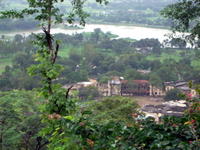
Near the top, when I turned round, I confronted an enormous sweep of watery green space, with red and yellow details, under mountainous bruised clouds, like a Constable painting. Towards the east, in shifting sunlight, I saw Forster’s lake and an old-looking yellowish-brown structure that could easily have been the Palace. I continued up and round. Just below Chamunda’s temple, there was a platform given over to amplifiers and speakers from which a blast of death metal suddenly came and went. I followed a group of saddhus round the corner. The temple was built into the side of the hill. It looked like a barracks or electrical relay station, despite the stupa and red paint. Two smiling worshippers went up the steps. For some reason, I didn’t go in after them. It couldn’t have been the rain, which now came skidding down. Perhaps it was diffidence, fear of causing offence with my shiny silver camera, sweating feet and newly discovered foreignness.
I went back, stopping once to look down on a maidan where a regiment of school-children stood to attention. A man on a podium was waving his arms about like a Hitler newsreel. There were two white goats just below me. Squirrels sprinted over my boots. Rain swooshed by my ears. Again that short blast of death metal, this time laced with feedback. A man, who must have sensed my mood, tried to entertain me with a coconut.
At the bottom, more confidently now, I directed my driver farther north, this time towards the building I had seen from the summit. ‘Palace, Palace’, I said (I found I tended to speak only in important-sounding nouns), ‘Palace’. We went up a track through frail neem trees and marshland. My guess had proved right. 'Tikuji! Tikuji!' Yes, this was Tikuji’s house, the appearance of which had suggested to Forster (so forcibly he used capital letters) 'a Lunatic Asylum’. Indeed, the building could have passed for one of those English manorial dwellings given over to the institutionalisation of the socially irresponsible, but it seemed to have gone to seed, like a stately home that’s missed out on the housing-price boom. There were wrecked cars in the long grass. Two men emerged from a shed. My driver shrugged enthusiastically. It seemed I couldn’t go in. I walked round to the place where Forster had photographed his picnic scene. There was a plaque on the door, commemorating, in English, Tikuji’s naming the Palace after his father—‘Shri Annand Bhavan Palace’—and remarking how appropriate this was as the name stood for 'Joy and Happiness’.
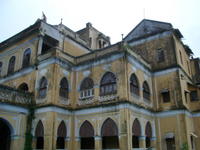

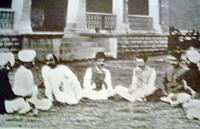
A little farther down the road was what I took to be the Guest House, now a squat for bicycle mechanics, fenced about with barbed wire and bits of blue tarpaulin, a shabby caravan in the grounds. The lake seemed farther away from the hill than it should have been, so far as Forster’s photograph was concerned. I couldn’t find the spot he’d taken it from. The promontory that appears in his scene was not in the same place. I walked along it anyway, looking for the view he’d had. The present-day citizens of Dewas had created a public garden out of this unpromising spit, with neem and rain trees, a restaurant and open-air seating. There were cellophane wrappers and Thumb soda bottles in the reeds. Between leafage and spotting rain, the hill looked diminished. I thought of that scene in A Passage to India, when Aziz and Mrs Moore’s son, Ralph (thought to have been Forster’s self-portrait), take a boat out to see the Krishna festival procession, which is preparing, under torchlight, to launch a palanquin for the king on the water. The boat collides with another one carrying Fielding and his wife, and everyone ends up in the water, the worshippers howling ‘with wrath or joy’. That was the festival’s climax, the narrator says, ‘so far as India admits of one’. It feels like the novel’s climax, too. The narrative dithers a bit, at this point (which is quite near the end), finally commenting: ‘Looking back at the great blur of the last twenty-four hours, no man could say where was the emotional centre of it, any more than he could locate the heart of a cloud’.
That was it. Having exhausted Dewas’s clouded heart, I left the next morning. In Indore, I would find a way of visiting Mandu, where Forster had wandered disconsolate among ruins, and the holy city of Ujjain, where he'd endured the insults of a Maharajah, ministered to a drunken Maharani, and received a ticking off from his best friend Masood (model for Aziz) for the setting. I would visit the stamping-grounds of two more of the genius locii of his novel. I also hoped to visit the Club in which Forster had first met Tikuji.
The Indore bus was a cramped little number (seats constructed for beings with preternaturally short thighs), carrying women textile workers and wasp-waisted men in shirts (pens in breast pocket) and ballooning trousers. The road was thoroughfare and resort for man and beast alike, each shunning the green spaces and inviting pools beyond. Looking out of the window, I was struck by the contrasting sizes of the two. Men and women all looked spindly and starved, whereas cows, dogs and pigs were uniformly well-nourished, even adopting the waddle and swank of a bourgeois class. There was no sense of town giving way to country and then to town once more. It was town making way for more town, the latter heralded by hellish smoking factories and row after row of lean-tos selling fire-grates. I had a repetitive and mutually uncomprehending conversation with a clerical youth about mustard gas.
I found a hotel in Indore that had a hot shower, English-speaking staff, and tips for getting to Mandu. It also had a guide-book to the state. The hotel restaurant was filled with men in suits, the jackets of which they kept draped over the backs of their chairs. Most were portly gents with mobiles and barking speech. Indore bills itself as a commercial city, and I had a vision of its hotels as the retreats of these business types, modern Club-men, arranging contracts and other important swindles, well away from the liability of demanding wives—the hotel as retrenchment for the mysogynistic, extortionate and very fat. The waiters ceremoniously brought over a tired-looking menu.
I had a chat with the man at reception who told me about Oum, a taxi-driver who spoke English. He’d be willing to take me to Mandu, which I now knew was 98 kilometers or four hours' drive away to the south, for a thousand or so rupees.
August 11th. Oum was dressed all in white like a hospital orderly. He had a strange-shaped head, like a tuberous vegetable. He was cheery and helpful, if a little too persistent, almost threateningly so (as I would find later), in his desire to fulfil the unstated wishes of his passenger. He introduced me to his car, which he pointed out was the same colour as his clothes. He had to pay the costs of maintenance, even though the vehicle belonged to the hotel, and hand over the greater percentage of his fee. 'Four hours?' he chortled, when I mentioned the time we might take to get to Mandu. 'They said that?'
We set off at midday, under dry skies. Noticing me craning up at the city architecture (I'd seen the same balconies in Arab countries), Oum started gesturing at historical or religious structures, the car swerving a little under his darting hands. These included Sikh and Jain temples, the tombs where Indore’s ancient Holkar rulers lay buried, and the town hall. The latter stood in a secluded spot, next a railway culvert and below formidable brick walls. I thought it might once have been Forster’s Club. My ‘Welcome to Indore’ pamphlet referred to it as Mahatma Ghandi Hall and said it was built in 1904 when it was called King Edward Hall. I didn't have time to explore this lineage and substitution. From the bridge it looked like the sort of place Forster might have enjoyed tiffin with Major Luard and where he'd first met Tikuji, ‘a bright and tiny young Indian’, who had come bounding over to wring both his hands.
The road to Mandu brought to mind the fair field full of folk the dreamer in Piers the Plowman came across on his search for the way to save his soul. There were no gluttons or sloths or greedy people, however. There were plenty of pilgrims, whom Oum kept calling ‘bolbom’, winding down his window to yell this word good-naturedly out at them: ‘Bolbom! Bolbom!’ to which they responded with alarming echolallia ‘Bolbom! Bolbom!’ These bolbom were all dressed in orange or red loincloths. Some carried objects like harpoons with decorated water bowls tied to either end, the contents retrieved, Oum said, from the Narmada river, on the shores of the sacred island of Omkareshwar, some 80 kilometres east of Indore. They were walking from the island back to Ujjain, from whence they had started. It appeared to be some sort of rite of passage, as most were youths on the threshold of adulthood. There were also buffaloes, bullocks and stately cream-coloured Brahminy bulls, women in sky-blue saris swaying under platters of fruit, wizened goatherds tottering under vast whipped cream turbans, shrines with waving pennants, sprawling village-markets with mynah-birds in cages, unsteady pyramids of tea-urns, free-loading monkeys. ‘Corn’, said Oum, plaintively, pointing at cobs roasting on a brazier. We passed a cow in someone’s living-room, goats nibbling grass stems on a roof. On the terraced clay banks of a river, there were brick kilns, and ghats, some women flagellating themselves with ropes of linen.
The farther afield we got, the more the road came to resemble a cheese-grater. Oum had adopted the tactic of driving very fast, so that we flew over even the most abyssal of potholes. Perhaps this was why, I reflected, he had to pay his own costs. (On the way back he playfully referred to his driving as ‘good for digestion’, and was pleased when I responded that it felt like Indian massage.) Mandu turned out to be a series of scattered palaces and pavilions erected on hill tops (the Vindhya ranges), overlooking deep gorges and the Nimar plain.
In a letter to his mother, written from the Guest House in Dhar, and reprinted in The Hill of Devi, Forster refers to a jungly deserted walled-city—which description made me think Mandu would be much more compressed and enclosed. Forster was too preoccupied, it seems, plotting vengeance against his rival for Tikuji’s attentions, 'Colonel Wilson'—who was to take over his secretarial duties later on—to take in the city’s vast sprawl and incompleteness. He had also gone by car and also had a guide. His driver had difficulties negotiating a steep turn in a ravine, after passing through the medieval gate below the Royal Enclave, and they had to summon repair-workers ('coolies', in Forster's imperial prose) to help jam the tyres with rocks. Forster then 'puddled about' in the car or walked through the ruins—with their tombs, clumpy mosques, palaces and sudden jade-green pools—but registered nothing save a ten-foot cobra and the calls of monkeys. Later, when recalling his visit in a narrative addendum to the letter, he thanks, rather savagely, Colonel Wilson for having embroiled him in a ‘middle-class row’ and so spoiling his enjoyment.
The road up the ravine seemed just as treacherous, but Oum had modern brakes and maniacal driving-skills. We didn't go immediately to the Royal Enclave, stopping off at the Restaurant Roopmati where Oum wanted to use the bathroom. When Oum reappeared he was suddenly insistent I should sample the local chicken, as—here, he became condescending and pompous, like Polonius—I would need to keep my strength up for the ruins, and views looked much better on a full stomach. (I had a sneaking suspicion he'd got a commission from the owner.) After lunch (which passed by pleasantly, one of those vacant but meaningful lacunae in existence when nothing whatsoever happens but you get the weird feeling that life has been subtly enhanced) we set off up the road, Oum excitedly pointing out helmet-shaped tombs.
I had no real desire to see Mandu itself, or to experience its views as the literature urged me to. What I wanted was to see was a ten-foot cobra and to hear monkeys ('between a hoot and a coo'), or, second best, to observe how local tourists coped with the scenery. There was no wild life, so I followed a party of Indian women, most of great age, around the Tiger Balcony and Swinging Palace. They moved with such agility and sprightliness, and I was so caught up with including them in my photographs, I soon fell behind. As I stumbled through the columns and cordoned-off baths, pretending to be fascinated by light and shadow, I saw them looking back and giggling from behind their hands, and I began to feel like a latter-day Benny Hill or Bob Guccione somewhat reduced in circumstances. All hopes of recording Native Habits and Customs were soon dashed by a massive downpour. I had no umbrella, so had to flee back to the Elephant Gate, where I found the other tourists togged out in sou'westers and shell suits. Oum had disappeared and I stood shivering in the rain, now feeling like a small resentful child waiting for the bus home. When Oum turned up, screaming apologies, my heart took a further dive when he said I had to see Jami Masjid which had been inspired by the great mosque of Damascus and that it would be a defiance of reason if I didn't also visit the Palace of Baz Bahadur and the Pavilion of his consort Roopmati. —Hadn't I come all this way to see Mandu? Hadn't I dined in a restaurant named after the prince's nightingale-voiced paramour?
The monsoon now swept across the hills, reducing visibility and turning the road into a flash-flood. We slithered up a track, fetching up at a barred gate, beyond which lay Baz Bahadur's Palace and, a few hundred metres farther on, Roopmati's rain-soaked pavilion. I could see I'd have to get pneumonia to placate Oum. I told him I'd be content with the Palace, truly, and that as it was the one place I'd wanted to visit all my life, everything else would seem inconsiderable and shoddy thereafter, a pale and misleading imitation. The Palace turned out to be a desultory building, like an abandoned aircraft hangar. It was filled with sheltering families who looked up from their chapattis with open-mouthed amusement as I splashed from arch to arch glaring down on the misty fields below. A mumbling youth tried to sell me something evil-looking in a plastic envelope.
When I returned, water sloshing in my boots, Oum, who must have been brooding over my reluctance to visit 'the most famous place in Madhya Pradesh', and then decided I must be testing him in some way, refused to let me back in the car to dry out. 'A waste of one hundred rupees!' (100 rupees had been the price of admission.) He would find an umbrella, he declared as if his life depended upon it, and personally escort me round Roopmati's Pavilion. There followed a comical, if grimly pathetic interlude, where he lunged from way-side stall to way-side stall, shaking people out of their sleep, threatening gaping children, and kicking a goat, until finally he snatched up a torn black umbrella, more spoke than cloth, and, seizing my arm, dragged me off into the monsoon. The wind had got up, and the rain drove straight into our faces. 'One hundred rupees!' Oum fumed, as he frog-marched me up the hill. The umbrella turned inside out, but Oum kept a grip on it and the small of my back, and shortly pitched me headlong into a smelly chamber, which he said was Roopmati's bath. Then he shoved me up through a hole in the roof to a crumbling wall which we scrambled along till we reached the Pavilion proper. The views were probably spectacular (the Pavilion overlooked the Deccan and the southern Indian plain), but there was too much mist, too much driving rain, for me to attain post-imperial panoramic mastery. 'Good?' Oum asked fiercely. 'Fantastic', I told him. 'You click-click?' 'I click-click'. I photographed grey vapour, then showed him the result. 'Ah', he said, 'Ah'. I had never seen a face literally light up with happiness before.
August 12th Oum reappeared, his whites now soiled and creased from his Mandu exertions. I had a change of clothes, so didn't look quite as ill-used. Oum watched me warily as I approached. 'Ujjain?' he said, evidently hopeful I'd changed my mind. 'Yes, Ujjain!' I said brightly. What, I wondered, had everyone got against the place? Forster's Muslim friend Masood found the spectacle of hundreds of saddhus perched on spikes, or entertaining one another to tea in sooty deshabille, distressing and offensive: 'My dear chap, I ask you!' Ujjain's saddhus would sometimes turn up in Dewas, looking for a hand-out, and when they got one, curse the place anyway. Every 12 years, the town, which is on the sacred river Shipra, plays host to the bathing ritual called Kumbh Mela when the waters are churned in memory of the battle between gods and demons for possession of a pot of nectar. The Punaras say that a few drops of nectar fell to the ground in four places, one of which was at Ujjain, which makes the place particularly blessed. Since upwards of 2,000,000 people (Forster puts the figure at 3,000,000) gather there for Kumbh Mela, it is said to be the biggest religious festival on earth. 2,000,000 plus people crammed into one spot on a river at one time is not conducive to good health, and Ujjain was notorious for its cholera. Forster notes that Scindhia, whom he describes as the insolent and buffoonish Maharajah of Gwalior, was fond of drinking the waters at Ujjain, which collocation (of Scindhia and Ujjain, rather than disease and Ujjain), seems to have accounted for his own distaste.
The road to Ujjain was much like the road to Mandu, the same potholes, the same lines of sauntering cattle and the same happy-go-lucky harpoon-wielding bombols. 'Bombol! Bombol!' yelled Oum, and 'Bombol! Bombol!' the bombols yelled back. If bombol meant 'pilgrim', there was, I decided, something disturbingly self-regarding or satirical about the whole enterprise. We stopped off at a temple, en route and met some of our bombol friends, at rest. None of them looked choleric. In fact, they looked, and sounded, incredibly hale and hearty, laughing at nothing until the tears came, as if they'd been smoking strong Dutch hashish.
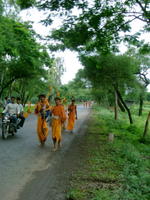
We passed a giant unending concrete wall attached to a hill-side, like a down-market version of the Great Wall of China. Oum said it was a 'jail', or would be when it was finished. Were there, I asked him, that many criminals in Indore? Who was such a prison intended for? Perhaps it was meant as an interment camp for delinquents from the future Kumbh Melas. This mystery was soon replaced by another. We passed a jeep containing, in Oum's considered estimate, 36 people. I told him about the Guinness Book of Records and what people occasionally do with an English telephone box. This pleased him. Disproportionate size and number became a matter of some importance on the road to Ujjain.
Ujjain, quite properly for a religious centre, was full of religious demonstration and people asking for financial assistance, the temples and river-side thronged with spectacularly dirty saddhus and amputees. It was all rather lovely, in the shafts of sunlight, with its elephants, buffalo market, strolling players, beggars and dhoti-wallahs cheek-by-jowl with brightly coloured idols and polished lingams. Oum showed me the spot where the Khumb Mela took place. The sides of the river had been converted into ranks of neat concrete ghats, and a system of weirs slowed the current below the main stretch of temples. It made me think of the innovations in crowd-management at Makkah and Old Trafford.
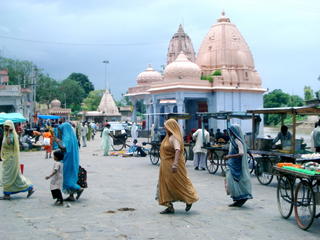

Oum took me to the school where Krishna had studied, Sandipani Ashram, and where he'd learnt 14 subjects and 64 arts. (Numbers, I have said, were a feature of our Ujjain conversation.) There I saw another European, the first I'd seen since I'd arrived in the state. She was dressed a la mode, with red paint on her forehead and castanets on her fingers, and appeared to be in a state of trance. Oum led me away. He was very protective.
Back near Ujjain, on the other side of the river, we visited a temple called, I believe, Harsiddhi, I can't be sure. I'd asked Oum to take me to Siddhavat where a gigantic banyan tree, grotesque with ancient sanctity, is said to attest to Siva's power, or it might have been Krishna's learning accomplishments. Anyway, Oum may not to have understood me too well. When we got to the temple, I found myself before a pitifully stunted growth that couldn't possibly be the banyan. Oum insisted it was. Somewhat nonplussed, I turned to watch a shaven-headed naked man conferring with a saint. They were face-to-face, sitting cross-legged on the ground. The man was, Oum said, mourning his aunt's death. The shaved head was a form of penance. The man who was manipulating at speed a row of small objects looked more like he was fleecing the saint with a shell-game.
I taught Oum some new English words: banana, buffalo and calf. We dismissed the latter as unnecessarily pedantic, as Oum's 'buffalo's child' seemed more appropriate and poetic. A buffalo, by the way, costs about 5,000 rupees, or three taxi-rides with Oum. At the Shri Kal-Bhairav temple, I learnt that the idol drinks wine, though it has no opening in the mouth. Indeed, Kal-Bhairav's image, which was all oval face, like an Easter egg, was cross-eyed with comic-book inebriation. Outside the temple, two boys were sitting behind baskets containing small disappointing cobras which had had their fangs removed, and now wriggled about in their raffia beds like black baby mice.
On the journey back to Indore, we passed two signs in English, one stating 'Nature is the signature of God', the other (more fashionably), 'Development, yes, but not at the expense of Environment'. The monsoon had flooded the road farther on, and several drivers had got out to wash down their vehicles, trousers and sleeves rolled up, elbows working over the wheel housings. The day ended on an indeterminate note. Oum vanished (forever, as it turned out), I ate a plate of stodgy dal, rainwater seeped across the protective plastic sheeting in the hotel lobby, a drenched businessman struck angrily at a potted rubber plant. While the weather vandalised the forecourt, I re-read that bit in A Passage to India where Aziz, moping around a mosque at night, interiorises the lines on a gravestone: 'Alas, without me for thousands of years / The Rose will blossom and the Spring will bloom, / But those who have secretly understood my heart — / They will approach and visit the grave where I lie'. The verse, which earlier I had quite liked, now struck me as saccharine and bleak, like a jingle for a TV commercial or a Smiths' lyric. Forster got it from Masood, and seems to have recognised its banality and egotism, alluding to it later as one might to a dead thing, an old love or an enthusiasm for Eric von Daniken.
The circumstances of Forster's visit to Ujjain are unstraightforward. Ujjain's prime source of attraction for the Dewas court—Scindhia, Maharajah of Gwalior and Tikuji's uncle and mentor—had arrived there to take the waters. Forster didn't want to go visit him, as he suspected him of being uncongenial. (Where Forster alliterates Scindhia as 'vigorous and vulgar', Tikuji counters with 'jolly and genial'.) Consequently, he could not approve of Tikuji's arrangements to go to Ujjain to attend the avuncular bath, but he has to go with him all the same in his role of loyal retainer. At dinner, Scindhia confirms Forster's suspicions by insulting him, first by chucking a box of matches at him, rather than passing it over, then by questioning his status. Tikuji seems to have done nothing, and Forster finds himself alone with the Maharani, who has unwittingly become drunk on the brandy Scindhia has been plying her with. They console one another. Ujjain, if Forster ever saw it, passes in a blur of shared hurt.
Nonetheless, Forster had some good things to say about Hinduism. Raised as a Christian but professing disbelief, he said that while he was quite taken with Islam he felt that Hinduism took the biscuit when it came to a sense of fun. Krishna, for example, was the only religious figure who could crack a joke. His jokes were pretty dire, but at least they were jokes. Only the ethically imperfect were incapable of hilarity... There you go. Perhaps I had come to India to re-discover this Orientalism, perhaps not. I hoped not. The ethical philosopher Emmanuel Levinas, not a man prone to seismic laughter, says that our task is not to look after ourselves but to look after others. It is in the faces of others that we see what it is that we are responsible for. Roughly-speaking. Once, looking into Oum's ugly mug looking into mine, I had detected the hint of a twinkle.
Levity defies gravity, but humour brings everything down to earth. Not yet, not there, A Passage to India concludes. That deferral, not its implicit call for a here and now, is the point. It is not friendships or connections or bridges that matter, it is, precisely, our travels beyond them to other places, other deferrals—our quarrels with Colonel Wilson, our adventures with umbrellas—that count. The world the senses perceive is not simply 'there', passive and inert; it calls to us, it solicits us. More than that, we go where it takes us, for uniquely mysterious reasons, and acquire distance, unfamiliarity, a new haircut. Jacques Derrida, puzzling over Levinas' inversion of traditional ethics (and logic), suggests that the claims of desire lead to infinite separation. We go where there is no going back, no refuge, no hope of return and very little chance of love. Perhaps this is why travel writers are on the whole miserable individuals who never make a success of their social encounters and always sleep in flea-pits. But there's no need for defensiveness or anxiety on that score. Derrida, for one, speaks of encounter as separation, which is the ethical imperative. We hop, we should hop, between the poles of that terror (or opportunity) and the desire to keep dry, out of the wind.
I regret not being able to go to the Barabar Caves in Bihar state, in north-east India. (They were too far away for my itinerary of days-not-weeks.) These caves are said to have provided Forster with the Marabar Hills and the setting for that scene where Adela Quested is molested (or not) by Aziz (or not). Mrs Moore, who has travelled with Aziz and his party (on the previously-mentioned train journey, supplemented by an elephant ride), experiences something less physically traumatising, but perhaps more spiritually devastating than Adela: an echo that simply goes 'boum' and by its terrifying banality and repetition reduces everything, everything, to the same vacuous utterance, boum, ouboum. All speech, all poetry, all religion, all that makes sense of life and the universe is, it seems to her, crushed into the same dust by the tread of that moronic articulation. This is no momentary apprehension, but the crisis that will haunt the rest of her life, souring her relations with God, family and time.
It is also the crisis—read as 'colonial nonsense' (or non-sense), a rupture in discourse—that the culture critic and sometime media personality Homi Bhabha will prosecute his peculiarly stony prose from, articulating a tortuous route for those who do not want to swap Anglo-Indian names for native ones (Bombay for Mumbai or Victoria Terminus for Chhatrapati Sivaji Terminus). Bhabha, by one of those mystifying symmetries that haunt my own hike, comes, it would seem, of the same background as the family that owns the Taj Mahal Palace hotel in Mumbai. —And it is to that Palace, with its mock-colonial foot-stools and proximity to an airport departure lounge, that my feet must now return.
The narrator of A Passage to India, in the same passage in which ouboum thumps and resounds, refers to the ruins of Mandu as site of another more agreeable echo: 'there are the long, solid sentences that voyage through the air at Mandu, and return unbroken to their creator. The echo in a Marabar cave is not like these'. I, sadly (but perhaps not), heard neither. But perhaps not.